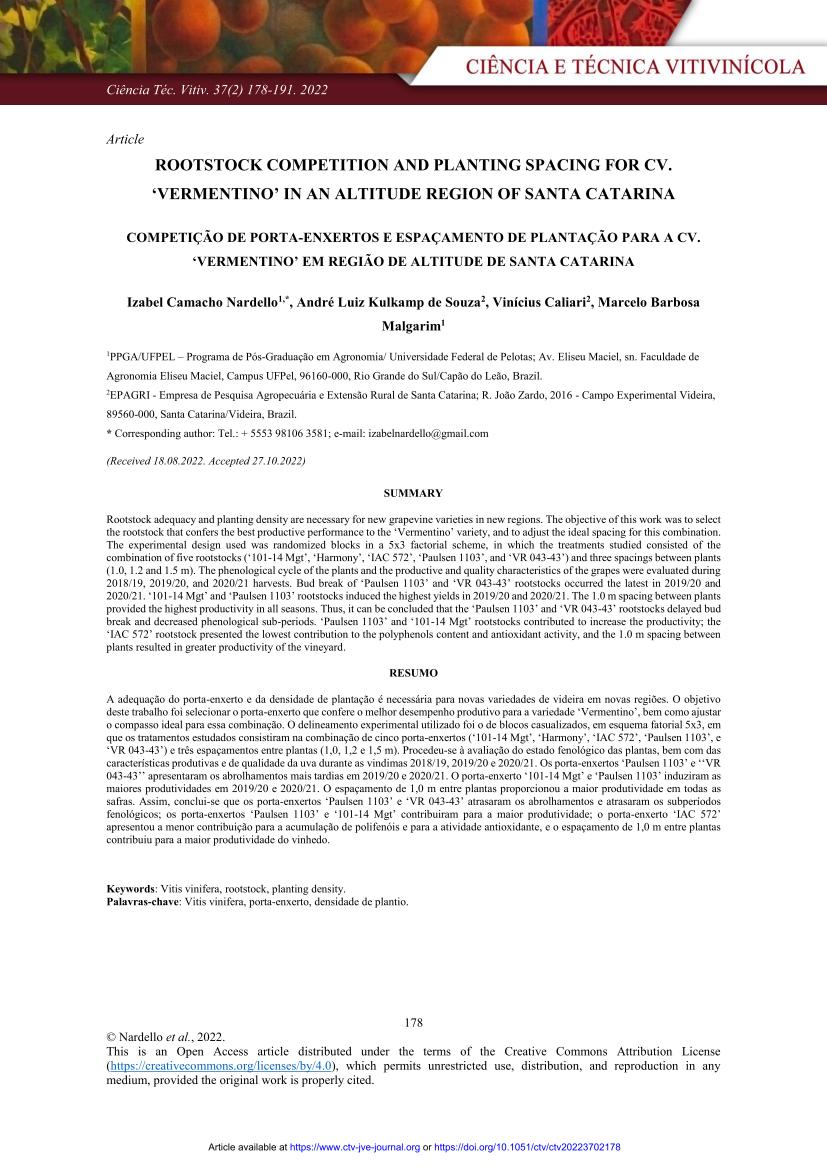 ROOTSTOCK COMPETITION AND PLANTING SPACING FOR CV. ‘VERMENTINO’ IN AN ALTITUDE REGION OF SANTA CATARINA
ROOTSTOCK COMPETITION AND PLANTING SPACING FOR CV. ‘VERMENTINO’ IN AN ALTITUDE REGION OF SANTA CATARINA
COMPETIÇÃO DE PORTA-ENXERTOS E ESPAÇAMENTO DE PLANTAÇÃO PARA A CV. ‘VERMENTINO’ EM REGIÃO DE ALTITUDE DE SANTA CATARINA
SUMMARY
Rootstock adequacy and planting density are necessary for new grapevine varieties in new regions. The objective of this work was to select the rootstock that confers the best productive performance to the ‘Vermentino’ variety, and to adjust the ideal spacing for this combination. The experimental design used was randomized blocks in a 5x3 factorial scheme, in which the treatments studied consisted of the combination of five rootstocks (‘101-14 Mgt’, ‘Harmony’, ‘IAC 572’, ‘Paulsen 1103’, and ‘VR 043-43’) and three spacings between plants (1.0, 1.2 and 1.5 m). The phenological cycle of the plants and the productive and quality characteristics of the grapes were evaluated during 2018/19, 2019/20, and 2020/21 harvests. Bud break of ‘Paulsen 1103’ and ‘VR 043-43’ rootstocks occurred the latest in 2019/20 and 2020/21. ‘101-14 Mgt’ and ‘Paulsen 1103’ rootstocks induced the highest yields in 2019/20 and 2020/21. The 1.0 m spacing between plants provided the highest productivity in all seasons. Thus, it can be concluded that the ‘Paulsen 1103’ and ‘VR 043-43’ rootstocks delayed bud break and decreased phenological sub-periods. ‘Paulsen 1103’ and ‘101-14 Mgt’ rootstocks contributed to increase the productivity; the ‘IAC 572’ rootstock presented the lowest contribution to the polyphenols content and antioxidant activity, and the 1.0 m spacing between plants resulted in greater productivity of the vineyard.
RESUMO
A adequação do porta-enxerto e da densidade de plantação é necessária para novas variedades de videira em novas regiões. O objetivo deste trabalho foi selecionar o porta-enxerto que confere o melhor desempenho produtivo para a variedade ‘Vermentino’, bem como ajustar o compasso ideal para essa combinação. O delineamento experimental utilizado foi o de blocos casualizados, em esquema fatorial 5x3, em que os tratamentos estudados consistiram na combinação de cinco porta-enxertos (‘101-14 Mgt’, ‘Harmony’, ‘IAC 572’, ‘Paulsen 1103’, e ‘VR 043-43’) e três espaçamentos entre plantas (1,0, 1,2 e 1,5 m). Procedeu-se à avaliação do estado fenológico das plantas, bem com das características produtivas e de qualidade da uva durante as vindimas 2018/19, 2019/20 e 2020/21. Os porta-enxertos ‘Paulsen 1103’ e ‘‘VR 043-43’’ apresentaram os abrolhamentos mais tardias em 2019/20 e 2020/21. O porta-enxerto ‘101-14 Mgt’ e ‘Paulsen 1103’ induziram as maiores produtividades em 2019/20 e 2020/21. O espaçamento de 1,0 m entre plantas proporcionou a maior produtividade em todas as safras. Assim, conclui-se que os porta-enxertos ‘Paulsen 1103’ e ‘VR 043-43’ atrasaram os abrolhamentos e atrasaram os subperíodos fenológicos; os porta-enxertos ‘Paulsen 1103’ e ‘101-14 Mgt’ contribuiram para a maior produtividade; o porta-enxerto ‘IAC 572’ apresentou a menor contribuição para a acumulação de polifenóis e para a atividade antioxidante, e o espaçamento de 1,0 m entre plantas contribuiu para a maior produtividade do vinhedo.
Autores: Izabel Camacho Nardello, André Luiz Kulkamp de Souza, Vinícius Caliari, Marcelo Barbosa Malgarim
DOI: https://doi.org/10.1051/ctv/ctv20223702178













